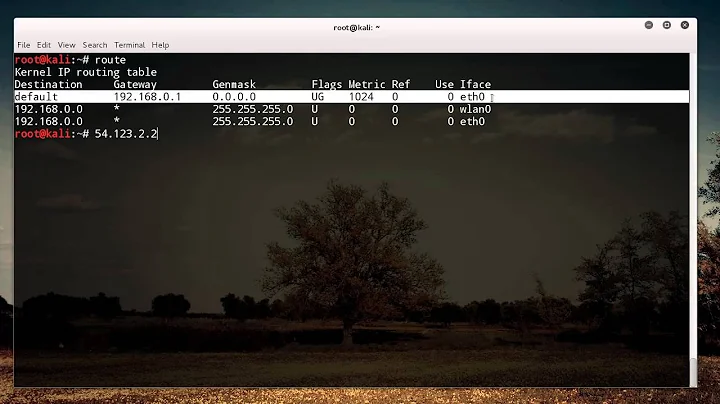Which configuration files affect the routing table of a Debian system
Solution 1
Both of your /etc/network/interfaces files contain one and the same error: the default gateway is specified twice.
You can have multiple default gateways, only under a very specific circumstance (neglecting metrics): that you have several routing tables, each specified in the file /etc/iproute2/rt_tables, but each routing table shall have a single default gateway.
You, instead, specify one for each interface, in the very same table main. So what we are seeing here is a slight difference in the implementation of the iproute2 package, and how it responds to errors.
In the case of Jessie, it establishes the first-mentioned gateway, 143.103.155.254, as the one and only gateway, simply because it is mentioned first. When the declaration of the second gateway, 27.126.19.193, takes place, nothing happens because it is not preceded by
ip route del default
Squeeze, instead, deals with the error in a different way: it limits the scope of the second gateway to link local. For more info on scope, see the iproute2 manual, which states:
scope link --- the address is link local, valid only on this device.
Wikipedia states that:
In a computer network, a link-local address is a network address that is valid only for communications within the network segment (link) or the broadcast domain that the host is connected to.
Thus the range (imprecise synonym for scope) of the second gateway has been very much limited to its network segment (i.e., its broadcast domain 143.103.155.0/24). Thus Jessie too, in a different way, has coped with your incorrect declaration of multiple gateways in the same routing table.
Of course, there is no expected behavior on how packages deal with errors. The correct way for you to setup your /etc/network/interfaces file is to omit the statement
gateway 143.103.155.254
altogether (this is strange also because it says that the gateway of your own pc is ... itself!). To see a nice explanation of this read the Initial Solution paragraph here; later, it is also explained how to add multiple gateways, with multiple routing tables.
If, as you claim,
I can try again to verify but I'm pretty sure that I tried that already and still was not able to reach any external IP.
it is most likely because you did not allow IPv4 forwarding from one interface to the other, (as sudo:
echo 1 > /proc/sys/net/ipv4/ip_forward
takes care of that), or because your iptables rules blocked forwarding.
Solution 2
The main difference between Squeeze and Jessie is that ip command calls ifconfig for the first and iproute2 for the last.
ifconfig doesn't known multiple gateway configurations, at least without metrics. That's why you see differences between the two ip route commands (or route -n (deprecated))
iproute2 can track multiple routing tables
ip route show all
Concept of primary and secondary network interfaces is just a way to distinguish them, usually called eth0 (1st) and eth1 (2nd), but order may vary!
And yes, you can set permanent route from /etc/network/interfaces throught the use of up like this:
up ip route add 1.2.3.4/24 via 1.2.3.1
Related videos on Youtube
sigy
Updated on September 18, 2022Comments
-
 sigy over 1 year
sigy over 1 yearAs far as I know basic network configuration goes into
/etc/network/interfacesand the system generates the routing table from these information. I was also taught that in general/etc/network/interfacesis the place to permanently add custom commands to manipulate the routing table (also suggested sometimes is/etc/rc.localor a custom script in/etc/network/if-up.d/). Furthermore one might specify custom routing tables in/etc/iproute2/rt_tables.- Are there any other places that will affect the (main) routing table?
- In particular, are there any other possibilities besides
/etc/network/interfacesto make manually added/deleted routes permanent?
- In particular, are there any other possibilities besides
- Does a system with multiple NICs have a concept of primary and secondary network interfaces or are these only wordings used to help the user? (During setup one has to choose the primary if and
/etc/network/interfaceswill contain an appropriate comment.) If such a concept exist, where can it be configured? - Are there any differences of the routing table concept between Debian Squeeze and Debian Jessie?
Background of my question is that I have a legacy Debian Squeeze system and a new Debian Jessie system which boot up with different routing tables but are (as far as I can tell) configured identical. I could manually manipulate the routing table to fit my needs and make the changes permanent using
/etc/network/interfacesbut I want to understand what is going on.EDIT
Here are the configuration files of both machines. I changed the first parts of each IP address for privacy reasons. However, subnets and the address parts of the respective networks were not changed. The
/etc/network/interfaces.d/directory on the Jessie machine is empty./etc/iproute2/rt_tableson Jessie# # reserved values # 255 local 254 main 253 default 0 unspec # # local # #1 inr.ruhep/etc/iproute2/rt_tableson Squeeze# # reserved values # 255 local 254 main 253 default 0 unspec # # local # #1 inr.ruhep/etc/rc.localon Jessie#!/bin/sh -e # # rc.local # # This script is executed at the end of each multiuser runlevel. # Make sure that the script will "exit 0" on success or any other # value on error. # # In order to enable or disable this script just change the execution # bits. # # By default this script does nothing. exit 0/etc/rc.localon Squeeze#!/bin/sh -e # # rc.local # # This script is executed at the end of each multiuser runlevel. # Make sure that the script will "exit 0" on success or any other # value on error. # # In order to enable or disable this script just change the execution # bits. # # By default this script does nothing. exit 0/etc/network/interfaceson Jessie# This file describes the network interfaces available on your system # and how to activate them. For more information, see interfaces(5). source /etc/network/interfaces.d/* # The loopback network interface auto lo iface lo inet loopback auto eth1 iface eth1 inet static address 143.103.155.254 netmask 255.255.255.0 network 143.103.155.0 gateway 143.103.155.254 # The primary network interface auto eth2 iface eth2 inet static address 27.126.19.194 netmask 255.255.255.248 network 27.126.19.192 broadcast 27.126.19.199 gateway 27.126.19.193 # dns-* options are implemented by the resolvconf package, if installed dns-nameservers 143.103.5.1 dns-search subdomain.domain.de/etc/network/interfaceson Squeeze# This file describes the network interfaces available on your system # and how to activate them. For more information, see interfaces(5). # The loopback network interface auto lo iface lo inet loopback # The primary network interface auto eth0 iface eth0 inet static address 143.103.155.254 netmask 255.255.255.0 network 143.103.155.0 gateway 143.103.155.254 auto eth2 iface eth2 inet static address 27.126.19.194 netmask 255.255.255.248 network 27.126.19.192 broadcast 27.126.19.199 gateway 27.126.19.193output of
ip route show table mainon Jessiedefault via 143.103.155.254 dev eth1 143.103.155.0/24 dev eth1 proto kernel scope link src 143.103.155.254 27.126.19.192/29 dev eth2 proto kernel scope link src 27.126.19.194output of
ip route show table mainon Squeeze27.126.19.192/29 dev eth2 proto kernel scope link src 27.126.19.194 143.103.155.0/24 dev eth0 proto kernel scope link src 143.103.155.254 default via 27.126.19.193 dev eth2 default via 143.103.155.254 dev eth0 scope linkoutput of
route -non JessieKernel IP routing table Destination Gateway Genmask Flags Metric Ref Use Iface 0.0.0.0 143.103.155.254 0.0.0.0 UG 0 0 0 eth1 143.103.155.0 0.0.0.0 255.255.255.0 U 0 0 0 eth1 27.126.19.192 0.0.0.0 255.255.255.248 U 0 0 0 eth2output of
route -non SqueezeKernel IP routing table Destination Gateway Genmask Flags Metric Ref Use Iface 27.126.19.192 0.0.0.0 255.255.255.248 U 0 0 0 eth2 143.103.155.0 0.0.0.0 255.255.255.0 U 0 0 0 eth0 0.0.0.0 27.126.19.193 0.0.0.0 UG 0 0 0 eth2 0.0.0.0 143.103.155.254 0.0.0.0 UG 0 0 0 eth0-
Marki555 about 9 yearsThat question is too broad and hard to answer... maybe you want us to compare those 2 configurations and find out why they setup the routing differently?
-
 sigy almost 9 years@Marki555: I added the two configurations and the resulting routing table
sigy almost 9 years@Marki555: I added the two configurations and the resulting routing table -
 sigy almost 9 yearsThe resulting routing on Squeeze is "working" as expected. The local network is 143.103.155.0/24 and I want all traffic to this to be handled by this machine. All other traffic should be forwarded to the external gateway via the other interface. I think I already tried leaving out the default gateway for 143.103.155.0/24 but the default route via 27.126.19.193 is still not added automatically.
sigy almost 9 yearsThe resulting routing on Squeeze is "working" as expected. The local network is 143.103.155.0/24 and I want all traffic to this to be handled by this machine. All other traffic should be forwarded to the external gateway via the other interface. I think I already tried leaving out the default gateway for 143.103.155.0/24 but the default route via 27.126.19.193 is still not added automatically. -
 sigy almost 9 yearsI can try again to verify but I'm pretty sure that I tried that already and still was not able to reach any external IP. To try it again I have to take around 120 ppl offline :/
sigy almost 9 yearsI can try again to verify but I'm pretty sure that I tried that already and still was not able to reach any external IP. To try it again I have to take around 120 ppl offline :/ -
 sigy almost 9 yearsIt is indeed working. However, the reason it did not work in my previous test is that it only works after a reboot, what I find strange. I also don't understand why Squeeze behaves different. Which behavior is the "expected" one?
sigy almost 9 yearsIt is indeed working. However, the reason it did not work in my previous test is that it only works after a reboot, what I find strange. I also don't understand why Squeeze behaves different. Which behavior is the "expected" one? -
Marki555 almost 9 yearsThe config syntax and meaning should be the same, only the init scripts which implement it are little different. See this for example (some parts are outdated) wiki.debian.org/NetworkConfiguration
- Are there any other places that will affect the (main) routing table?
-
 sigy almost 9 yearsIf ifconfig doesnt know multiple gateway configurations but is used in Squeeze shouldn't I see the opposite? Squeeze is the OS which produces two default routes.
sigy almost 9 yearsIf ifconfig doesnt know multiple gateway configurations but is used in Squeeze shouldn't I see the opposite? Squeeze is the OS which produces two default routes. -
maxxvw almost 9 yearsYou have iproute2 installed, that's the only reason i can see. But look at the
scope linkfor the 2nd gateway. The other one is the real default gateway -
 sigy almost 9 yearsCan you clarify what you mean? Who creates the second default route if not ifconfig? And if it is ip why does it not get created on Jessie? I must admit I am a bit confused now...
sigy almost 9 yearsCan you clarify what you mean? Who creates the second default route if not ifconfig? And if it is ip why does it not get created on Jessie? I must admit I am a bit confused now... -
 sigy almost 9 yearsAs I mentioned in the other comment it didn't work when I tried it because a simple /etc/init.d/networking restart seems not to be enough. Afterwards I didn't have any default route. However, after I restarted the whole system the routing was setup correctly.
sigy almost 9 yearsAs I mentioned in the other comment it didn't work when I tried it because a simple /etc/init.d/networking restart seems not to be enough. Afterwards I didn't have any default route. However, after I restarted the whole system the routing was setup correctly.




